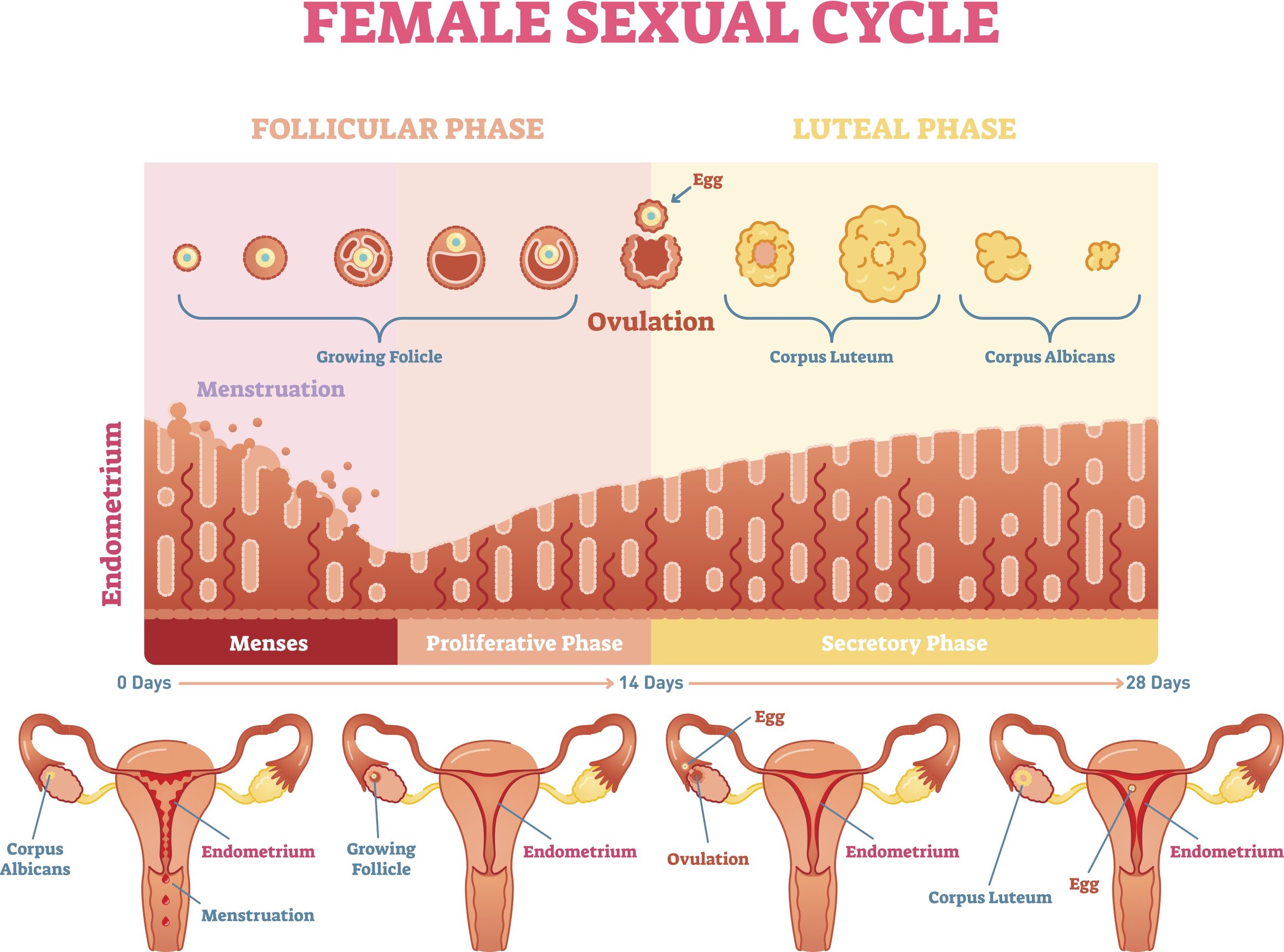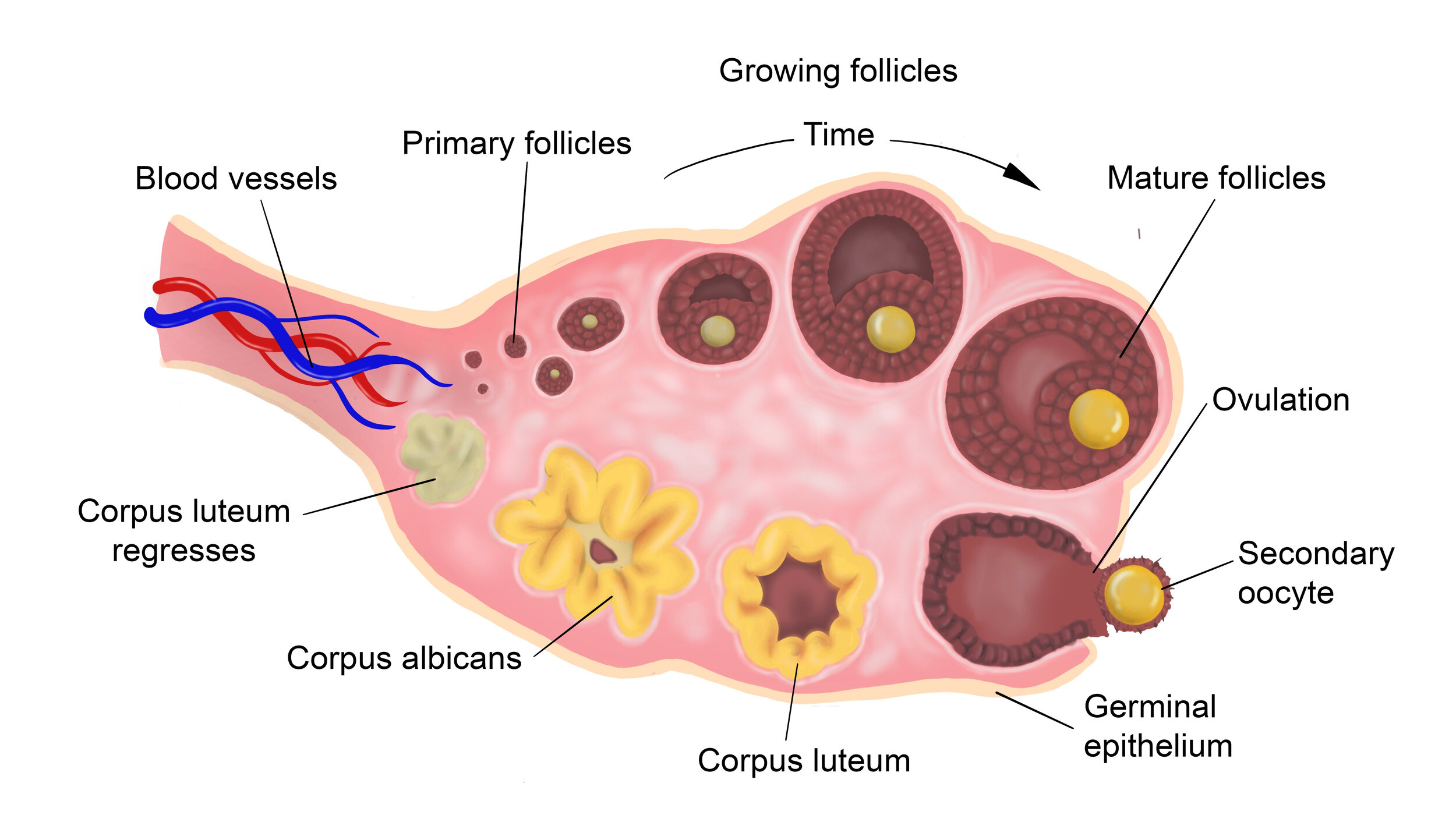Your Menstrual Cycle
It happens every month from the age of 13 (average) but do you know exactly what is happening and when during your menstrual cycle? In this post we talk through your cycle so that you have a better understanding of what is happening to your body and at which point you should be at your most fertile.
Day 1-5
The first day of your cycle is the day you start menstrual bleeding. If this starts at night we usually call the following day your day 1; the first day of heavy bleeding. Bleeding can last anywhere between 3 and 8 days with the average length of a woman's period being 5 days. You will usually experience heavier, bright red bleeding during the first two days of your cycle.
Day 6-14
Your period has stopped for another month (Hooray!) and you're back to feeling like your normal self again. Your body is now preparing for the possibility of pregnancy. The uterine lining (endometrium) becomes thicker and the presence of blood and nutrients increases.
Day 14-25
At this point in your cycle you are most fertile! Around day 14 of your cycle an egg will be released from one of your ovaries. It travels down your fallopian tube towards your uterus. If there is sperm present in the fallopian tubes there is a chance that fertilisation of your egg will occur. A fertilised egg now becomes an embryo which will then travel to the uterus and attach to the uterine wall (implantation).
Did you know? Once sperm has entered a woman's body it can survive for up to 5 days. If you've had intercourse even a few days before your day of ovulation, there's chance you may still become pregnant
Day 25-28
If your released egg does not become fertilised or if a fertilised egg (embryo) does not attach to the uterine wall, your body will begin to prepare for another period. The hormones in your body will change to encourage the uterus to shed its lining and, along with the egg, breakdown. Menstrual bleeding will begin, signalling day 1 of your next menstrual cycle.
Now, Let's Talk: Your Menstrual Cycle
(But A Little More Technical)
So now that you understand the basics of what is happening to your body during the menstrual cycle, let's get a little more technical and talk hormones. Everything that happens to our bodies during the menstrual cycle is triggered by a change in hormones.
Follicular Phase Days 1-13
Despite you being on your period during the early part of this phase, your ovaries are also preparing to ovulate again on day 14 (approx). Recruitment of follicles for this cycle has already started since before you started to bleed (get your head around that one!).
The pituitary gland located in the brain releases the FSH hormone causing several fluid-filled follicles, each containing an egg, to rise on the surface of the ovaries. One of the follicles will soon become dominant (the competitive one) to develop a single 'mature' egg. The subservient follicles (aka the stragglers) will shrink back at die in a process called 'atresia' . If more than one follicle becomes dominant, a multiple pregnancy may occur. This is how we get twins. Check out our article on Ovarian Reserve for more information on what happens to these other eggs each month.
The dominant follicle produces Estrogen at levels which increase during the follicular stage and peak around days 13 and 14. In response to these increasing levels of Estrogen, the lining of the uterus wall (endometrium) becomes enriched with blood and therefore thicker. This high level of Estrogen has a positive feedback affect on the hypothalamus (brain), secreting gonadotropin-releasing hormone (GnRH) as well as the anterior pituitary, both causing an increase in FSH and LH which results in the LH surge required for ovulation.
For the geeks: The entire growth phase of a follicle is 220 days. 220 days from a primary follicle to an ovulated follicle. That's a long road
Ovulatory Phase Day 14
The surge in GnRH and LH hormones causes the mature egg to be released from the dominant follicle and causes your sex drive to spike, meaning its your perfect time to have sexual intercourse as you are at your most fertile. Once the egg is released, the follicle seals over (corpus luteum). The egg will enter your fallopian tube where, if sperm is also present, it may become fertilized. If sperm is not present, or if fertilization does not occur, the egg will disintegrate within 24 hours.
Luteal Phase Days 15-28
After the release of the egg, levels of FSH and LH drop. The corpus luteum follicle produces progesterone which, if fertilization has occurred, prevents the endometrial lining from being shed. This supports early pregnancy until the time the placenta takes over between 7-10 weeks of gestation. If fertilization has not occurred, the corpus luteum disintegrates and progesterone levels drop, signalling for the endometrial lining to begin shedding and for another period to begin.
Cycle Length: There is a wide range of normal when it comes to cycle length
Cycle length can vary from woman to woman. Average cycle length is 28-30 days however some can last as little as 23 days and as long as 40. The variation in cycle length typically happens at the beginning of the cycle (follicular phase) rather than the second half (luteal phase). The luteal phase is usually quite predictable usually lasting 14 days (though can be as short as 12).
Typically in a 30 day cycle, you will have ovulated by day 16 but it could be as late as day 18. If you get your period more regularly, say every 24 days, you are likely to have ovulated on day 10 and possibly as late as day 12. If your period comes every 35 days you are likely ovulating day 21, and as late as day 23. If your cycles are irregular in pattern say 23 days one month, 40 days another, you will need to look out for other signs of ovulation such as checking basal body temperate (using BBT Charts), cervical mucus or using ovulation predictor kits which use urine to detect the Luteininzing Hormone (LH) surge thats signifies ovulation. Other ways to determine ovulation is by transvaginal ultrasound and hormonal blood tests which would require a trip to the clinic.
Have a question about your menstrual cycle? Feel free to leave a comment below or submit your question on our contact page to feature in our Your Questions Answered.


